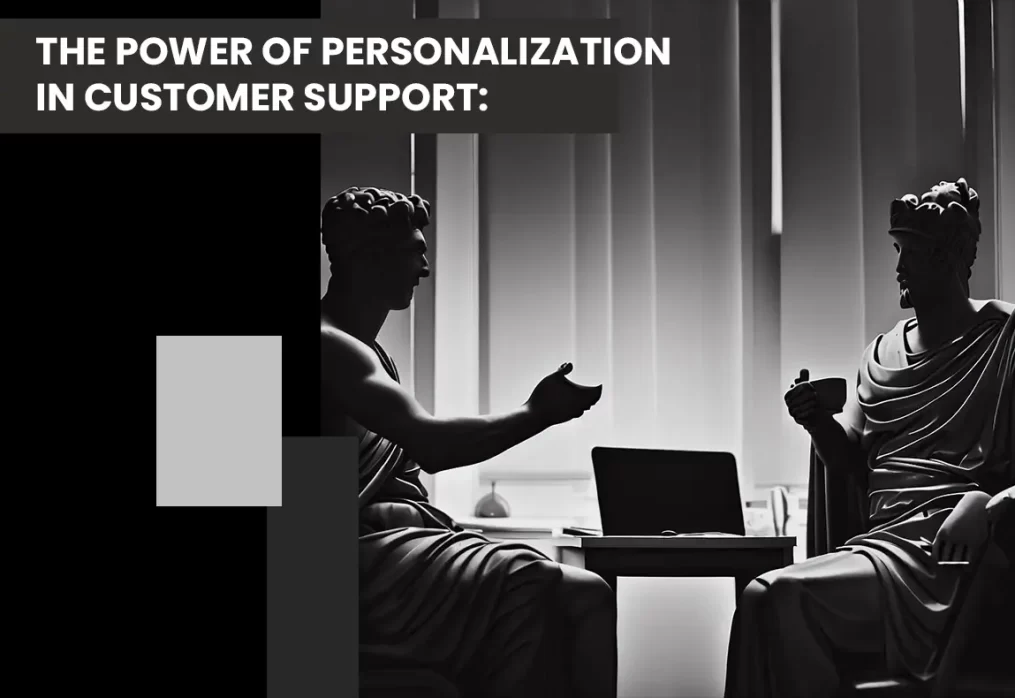The Power of Personalization in Customer Support
Personalization in customer support has emerged as a powerful tool for businesses seeking to create meaningful connections with their customers. In today’s competitive landscape, delivering exceptional customer experiences is crucial for customer satisfaction and loyalty. The importance of personalized interactions cannot be overstated, as they foster a sense of value and understanding in customers. By tailoring support experiences to individual customers, businesses can address their specific needs and preferences, ultimately enhancing customer satisfaction and loyalty. Leveraging customer data and advanced technologies, such as AI and machine learning, companies can gather insights, anticipate customer requirements, and deliver tailored solutions. Embracing the power of personalization to increase customer support enables businesses to forge stronger relationships with customers and gain a competitive advantage in the market.
Understanding the Value of Personalized Interactions
Personalized interactions have become increasingly valuable in today’s fast-paced and digitally-driven world. Here are five points that highlight the importance and benefits of personalized interactions:
Enhanced Customer Experience
Personalized interactions allow businesses to cater to individual customers’ unique needs and preferences. By understanding their preferences, past interactions, and purchase history, companies can deliver tailored experiences, increasing customer satisfaction and loyalty.
Increased Engagement
Personalization creates a deeper level of engagement with customers. By addressing customers by their names, acknowledging their specific interests, and offering relevant recommendations, businesses can capture their attention and keep them actively involved, leading to longer-lasting relationships.
Improved Conversion Rates
Personalized interactions have significantly improved conversion rates. By presenting customers with personalized offers and recommendations based on their preferences and behaviors, businesses can create a sense of exclusivity and relevance, increasing the likelihood of a purchase.
Strengthened Brand Perception
When businesses invest in personalized interactions, customers perceive them as caring and attentive. This fosters a positive brand image and strengthens the customer’s trust and loyalty towards the brand. Customers are more likely to choose brands that provide personalized experiences, resulting in increased brand advocacy.
Data-Driven Insights
Personalized interactions generate valuable data that can be leveraged for further improvements. By analyzing customer behavior, preferences, and feedback, businesses can gain insights into trends, patterns, and areas for optimization. This data-driven approach allows continuous refinement of personalized interactions, leading to greater customer satisfaction and business success.
The Role of Customer Data
Customer data is pivotal in tailoring support experiences, anticipating customer requirements, building stronger customer relationships, and gaining a competitive edge. Businesses can understand individual preferences and provide personalized solutions by analyzing customer data, enhancing the customer support experience. Anticipating customer requirements based on data insights allows for proactive problem-solving and a seamless customer journey. Utilizing customer data enables businesses to build stronger relationships by offering relevant recommendations and targeted communication. Ultimately, leveraging customer data effectively gives businesses a competitive edge by delivering superior experiences that meet and exceed customer expectations.
Harnessing Advanced Technologies
Harnessing advanced technologies is crucial for businesses to stay competitive and drive innovation. Businesses can unlock new possibilities within artificial intelligence, machine learning, automation, and data analytics. These technologies enable efficient and accurate decision-making, automate repetitive tasks, and extract valuable insights from vast data. Harnessing advanced technologies allows businesses to streamline operations, optimize processes, and enhance productivity. It also opens doors to new business models and revenue streams. By embracing these technologies, businesses can gain a competitive advantage, improve customer experiences, and adapt to rapidly changing market dynamics, ultimately fostering growth and success in the digital age.
Tailoring Support Experiences
Tailoring support experiences is essential for businesses to provide personalized and exceptional customer service. Businesses can offer targeted assistance and solutions by understanding customers. needs and preferences. This customization enhances the overall support experience, increasing customer satisfaction and loyalty. Tailoring support experiences involves leveraging customer data, implementing proactive communication, and employing personalized recommendations. By investing in personalized support, businesses can build stronger customer relationships, foster trust, and differentiate themselves from competitors. Ultimately, tailoring support experiences enables businesses to meet customer expectations and deliver a high level of service that leaves a lasting positive impression.
Anticipating Customer Requirements
Anticipating customer requirements is a critical aspect of delivering exceptional customer experiences. By understanding and predicting what customers need before explicitly expressing it, businesses can stay one step ahead and provide proactive solutions. Here are five points that highlight the importance and benefits of anticipating customer requirements:
Enhanced Customer Satisfaction
Anticipating customer requirements demonstrates a deep understanding of their needs and preferences. By proactively addressing their needs, businesses can exceed customer expectations and deliver a superior experience. This leads to increased customer loyalty.
Improved Responsiveness
Anticipating customer requirements allows businesses to respond quickly and efficiently. By staying ahead of customer demands, businesses can have the necessary resources, products, or services ready, resulting in shorter response times and faster issue resolution.
Personalized Offerings
Anticipating customer requirements enables businesses to offer personalized solutions. By analyzing customer data, behavior patterns, and purchase histories, businesses can tailor their offerings to match individual preferences. This personalized approach creates exclusivity and relevance, fostering stronger customer connections.
Competitive Advantage
Anticipating customer requirements gives businesses a competitive edge. By staying proactive and anticipating emerging trends or customer demands, businesses can innovate and develop products or services ahead of their competitors. This positions them as market leaders and attracts a larger customer base.
Long-Term Customer Relationships
Anticipating customer requirements builds trust and strengthens relationships. When businesses consistently deliver what customers need, even before they ask, it creates a positive and lasting impression. This fosters customer loyalty and advocacy, leading to repeat business and positive word-of-mouth recommendations.
Building Stronger Customer Relationships
Building stronger customer relationships is a key objective for businesses aiming to thrive in today’s competitive landscape. Businesses can foster trust, loyalty, and advocacy by cultivating customer rapport. This involves consistent and personalized communication, actively listening to customer feedback, and going the extra mile to meet their needs. Building stronger customer relationships requires a customer-centric approach, where businesses prioritize understanding individual preferences and providing exceptional experiences. Strong customer relationships result in increased customer retention, higher lifetime value, and positive word-of-mouth recommendations, ultimately contributing to long-term business success.
Gaining a Competitive Edge
Gaining a competitive edge is crucial for businesses to succeed in a crowded marketplace. Here are three points that highlight effective strategies for gaining a competitive edge:
Differentiation
Businesses can differentiate themselves by offering unique products, services, or features that set them apart from competitors. This can be achieved through innovation, superior quality, customization options, or a distinctive brand identity. Businesses can attract customers and stand out by providing something valuable and distinct.
Customer Experience
Delivering exceptional customer experiences is a powerful way to gain a competitive edge. By prioritizing customer satisfaction, businesses can create positive interactions at every touchpoint. This includes providing personalized support, streamlining processes, and investing in user-friendly interfaces. A seamless and enjoyable customer experience can significantly impact customer loyalty and retention.
Continuous Improvement
Businesses that embrace continuous improvement can outpace their competitors. By regularly evaluating and refining their operations, products, and services, businesses can stay ahead of changing market trends and customer preferences. This involves gathering and analyzing data, seeking feedback, and implementing necessary adjustments. Continuous improvement ensures businesses remain relevant, agile, and responsive to evolving market demands.
Final Thought
In conclusion, the power of personalization to enhance customer support cannot be overstated. By understanding individual customers’ unique needs and preferences, businesses can deliver tailored and exceptional support experiences. Personalization in customer support enhances customer satisfaction, increases engagement, and builds stronger relationships. To achieve this, businesses can leverage customer data, implement proactive communication strategies, and offer personalized recommendations. By embracing personalization in customer support, businesses can differentiate themselves, gain a competitive advantage, and foster long-term customer loyalty. The ability to tailor support experiences to the individual customer is a powerful tool that drives customer satisfaction and contributes to the overall success of a business.


